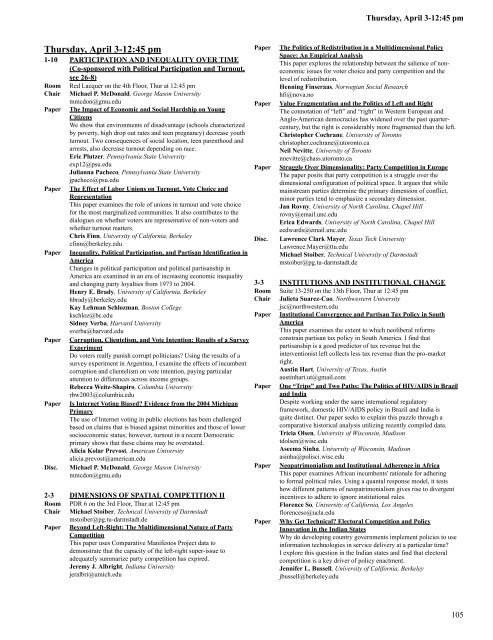2008 Conference Program - Midwest Political Science Association
2008 Conference Program - Midwest Political Science Association
2008 Conference Program - Midwest Political Science Association
You also want an ePaper? Increase the reach of your titles
YUMPU automatically turns print PDFs into web optimized ePapers that Google loves.
Thursday, April 3-12:45 pm<br />
Thursday, April 3-12:45 pm<br />
1-10 PARTICIPATION AND INEQUALITY OVER TIME<br />
(Co-sponsored with <strong>Political</strong> Participation and Turnout,<br />
Room<br />
Chair<br />
Paper<br />
Paper<br />
Paper<br />
Paper<br />
Paper<br />
Disc.<br />
see 26-8)<br />
Red Lacquer on the 4th Floor, Thur at 12:45 pm<br />
Michael P. McDonald, George Mason University<br />
mmcdon@gmu.edu<br />
The Impact of Economic and Social Hardship on Young<br />
Citizens<br />
We show that environments of disadvantage (schools characterized<br />
by poverty, high drop out rates and teen pregnancy) decrease youth<br />
turnout. Two consequences of social location, teen parenthood and<br />
arrests, also decrease turnout depending on race.<br />
Eric Plutzer, Pennsylvania State University<br />
exp12@psu.edu<br />
Julianna Pacheco, Pennsylvania State University<br />
jpacheco@psu.edu<br />
The Effect of Labor Unions on Turnout, Vote Choice and<br />
Representation<br />
This paper examines the role of unions in turnout and vote choice<br />
for the most marginalized communities. It also contributes to the<br />
dialogues on whether voters are representative of non-voters and<br />
whether turnout matters.<br />
Chris Finn, University of California, Berkeley<br />
cfinn@berkeley.edu<br />
Inequality, <strong>Political</strong> Participation, and Partisan Identification in<br />
America<br />
Changes in political participation and political partisanship in<br />
America are examined in an era of increasing economic inequality<br />
and changing party loyalties from 1973 to 2004.<br />
Henry E. Brady, University of California, Berkeley<br />
hbrady@berkeley.edu<br />
Kay Lehman Schlozman, Boston College<br />
kschloz@bc.edu<br />
Sidney Verba, Harvard University<br />
sverba@harvard.edu<br />
Corruption, Clientelism, and Vote Intention: Results of a Survey<br />
Experiment<br />
Do voters really punish corrupt politicians Using the results of a<br />
survey experiment in Argentina, I examine the effects of incumbent<br />
corruption and clientelism on vote intention, paying particular<br />
attention to differences across income groups.<br />
Rebecca Weitz-Shapiro, Columbia University<br />
rbw2003@columbia.edu<br />
Is Internet Voting Biased Evidence from the 2004 Michigan<br />
Primary<br />
The use of Internet voting in public elections has been challenged<br />
based on claims that is biased against minorities and those of lower<br />
socioeconomic status; however, turnout in a recent Democratic<br />
primary shows that these claims may be overstated.<br />
Alicia Kolar Prevost, American University<br />
alicia.prevost@american.edu<br />
Michael P. McDonald, George Mason University<br />
mmcdon@gmu.edu<br />
2-3 DIMENSIONS OF SPATIAL COMPETITION II<br />
Room PDR 6 on the 3rd Floor, Thur at 12:45 pm<br />
Chair Michael Stoiber, Technical University of Darmstadt<br />
mstoiber@pg.tu-darmstadt.de<br />
Paper Beyond Left-Right: The Multidimensional Nature of Party<br />
Competition<br />
This paper uses Comparative Manifestos Project data to<br />
demonstrate that the capacity of the left-right super-issue to<br />
adequately summarize party competition has expired.<br />
Jeremy J. Albright, Indiana University<br />
jeralbri@umich.edu<br />
Paper<br />
Paper<br />
Paper<br />
Disc.<br />
The Politics of Redistribution in a Multidimensional Policy<br />
Space: An Empirical Analysis<br />
This paper explores the relationship between the salience of noneconomic<br />
issues for voter choice and party competition and the<br />
level of redistribution.<br />
Henning Finseraas, Norwegian Social Research<br />
hfi@nova.no<br />
Value Fragmentation and the Politics of Left and Right<br />
The connotation of “left” and “right” in Western European and<br />
Anglo-American democracies has widened over the past quartercentury,<br />
but the right is considerably more fragmented than the left.<br />
Christopher Cochrane, University of Toronto<br />
christopher.cochrane@utoronto.ca<br />
Neil Nevitte, University of Toronto<br />
nnevitte@chass.utoronto.ca<br />
Struggle Over Dimensionality: Party Competition in Europe<br />
The paper posits that party competition is a struggle over the<br />
dimensional configuration of political space. It argues that while<br />
mainstream parties determine the primary dimension of conflict,<br />
minor parties tend to emphasize a secondary dimension.<br />
Jan Rovny, University of North Carolina, Chapel Hill<br />
rovny@email.unc.edu<br />
Erica Edwards, University of North Carolina, Chapel Hill<br />
eedwards@email.unc.edu<br />
Lawrence Clark Mayer, Texas Tech University<br />
Lawrence.Mayer@ttu.edu<br />
Michael Stoiber, Technical University of Darmstadt<br />
mstoiber@pg.tu-darmstadt.de<br />
3-3 INSTITUTIONS AND INSTITUTIONAL CHANGE<br />
Room Suite 13-250 on the 13th Floor, Thur at 12:45 pm<br />
Chair Julieta Suarez-Cao, Northwestern University<br />
jsc@northwestern.edu<br />
Paper Institutional Convergence and Partisan Tax Policy in South<br />
America<br />
This paper examines the extent to which neoliberal reforms<br />
constrain partisan tax policy in South America. I find that<br />
partisanship is a good predictor of tax revenue but the<br />
interventionist left collects less tax revenue than the pro-market<br />
right.<br />
Austin Hart, University of Texas, Austin<br />
austinhart.ut@gmail.com<br />
Paper One “Trips” and Two Paths: The Politics of HIV/AIDS in Brazil<br />
and India<br />
Despite working under the same international regulatory<br />
framework, domestic HIV/AIDS policy in Brazil and India is<br />
quite distinct. Our paper seeks to explain this puzzle through a<br />
comparative historical analysis utilizing recently compiled data.<br />
Tricia Olsen, University of Wisconsin, Madison<br />
tdolsen@wisc.edu<br />
Aseema Sinha, University of Wisconsin, Madison<br />
asinha@polisci.wisc.edu<br />
Paper Neopatrimonialism and Institutional Adherence in Africa<br />
This paper examines African incumbents' rationale for adhering<br />
to formal political rules. Using a quantal response model, it tests<br />
how different patterns of neopatrimonialism gives rise to divergent<br />
incentives to adhere to ignore institutional rules.<br />
Florence So, University of California, Los Angeles<br />
florenceso@ucla.edu<br />
Paper Why Get Technical Electoral Competition and Policy<br />
Innovation in the Indian States<br />
Why do developing country governments implement policies to use<br />
information technologies in service delivery at a particular time<br />
I explore this question in the Indian states and find that electoral<br />
competition is a key driver of policy enactment.<br />
Jennifer L. Bussell, University of California, Berkeley<br />
jbussell@berkeley.edu<br />
105










